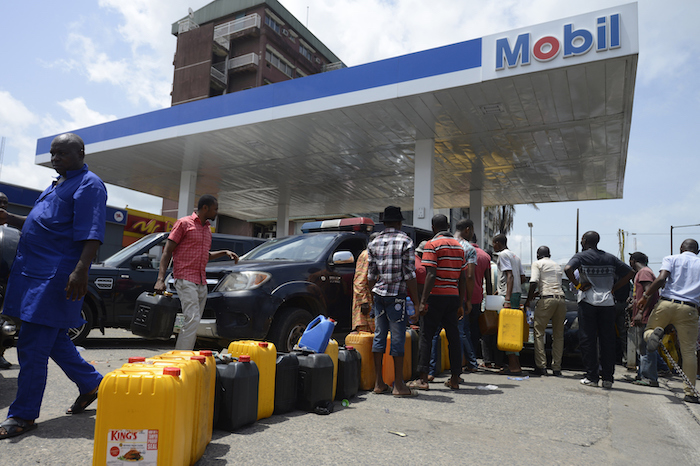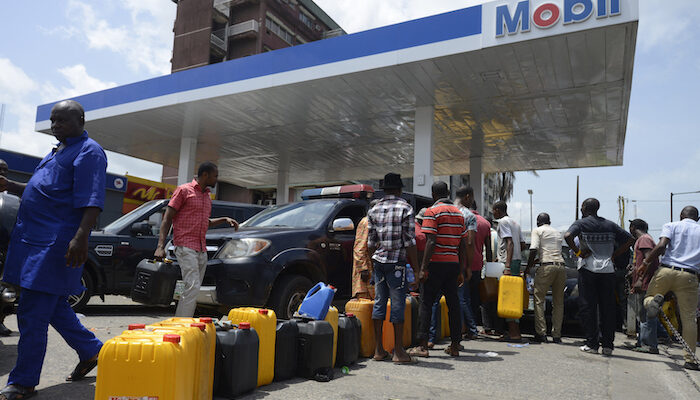
People queue with jerrycans to buy fuel at Mobil filling station in Lagos, on May 21, 2015. Long queues formed at petrol stations across oil-rich Nigeria on May 21 following a row over subsidy payment to petrol importers as well as sale of government oil blocks to private investors, union officials said. AFP PHOTO/PIUS UTOMI EKPEI (Photo credit should read PIUS UTOMI EKPEI/AFP/Getty Images)
There were growing concerns over a potential fuel scarcity on Monday following a coordinated protest by petroleum marketers and truck owners against the Lagos State Government’s enforcement of a controversial N12,500 e-call-up levy on trucks operating along the Lekki-Epe corridor.
Members of the Independent Petroleum Marketers Association of Nigeria (IPMAN) and the National Association of Road Transport Owners (NARTO) withdrew haulage and fuel trucks from the area in protest of what they described as an “exploitative, ill-timed, and burdensome” policy.
The protest effectively stalled fuel tanker movements from the corridor, sparking fears about fuel distribution disruptions in Lagos and across the country. The Lekki axis plays a critical role in petroleum logistics due to the presence of the massive Dangote Refinery and other key infrastructure.
Protesters argued that the e-call-up levy—introduced through a public-private partnership (PPP)—is being implemented without sufficient infrastructure or consultation with industry stakeholders. They claim the policy fails to solve any actual traffic problems, as cited by state officials.
“All efforts to reach a compromise have been ignored by the government,” said Dele Tajudeen, former South-West IPMAN chairman. “There is no gridlock along the corridor. This policy is not about solving traffic—it’s about enriching private interests.”
Tajudeen further alleged that the levy funds are funneled to private entities rather than the government, raising transparency concerns.
“We already pay N7,000 at the toll gate, now they want another N12,500. That’s N19,500 before we even load fuel. And we hear the money doesn’t go to the government—how is that fair or sustainable?”
Truck owners warned that the new levy would further inflate fuel prices, exacerbating Nigeria’s economic woes. They pointed to rising operational costs, such as diesel prices and spare parts, which have already placed the sector under immense financial strain.
Gbenga Olubasusi, NARTO Chairman at the Lekki Free Trade Zone, lamented the soaring cost of logistics: “Trailer tires now cost over N700,000, and trucks that were N4.5 million now cost more than N40 million. Adding this levy will cripple businesses and drive up fuel prices.”
He also criticized the lack of basic infrastructure: “There’s no government trailer park here. We use private parks and pay N3,000–N5,000 daily. What are we paying this extra money for?”
NARTO leaders emphasized that the move was not a strike but a “strategic withdrawal of services.”
“This isn’t industrial action,” said Wale Oladeinde, NARTO Zonal Secretary (South-West). “The trucks are privately owned, and no one can force us to operate under exploitative policies.”
Echoing the sentiment, Lagos State NARTO Chairman, Kayode Odunowo, added:
“We’ve cooperated in the past with similar policies in Apapa, and the government failed to deliver. This time, we’re saying no.”
He warned of a ripple effect if the issue remains unresolved: “Fuel, containers, food—they all move by truck. No NARTO, no Nigeria.”
Olaniyan Yekini, Vice Chairman of IPMAN (Mosimi Depot), also called out Lagos State for lacking adequate infrastructure while imposing additional levies.
“Oyo and Ogun states have proper trailer parks. Lagos provides parks for buses, but ignores trucks—yet demands more money from us. It’s unjust.”
Despite the strong opposition, both IPMAN and NARTO said they remain open to meaningful dialogue. They urged the Lagos State Government to suspend the levy and initiate inclusive consultations.
“We’re not against regulation,” said Oladeinde. “But it must be fair and transparent. You don’t tax an industry without providing the environment for it to thrive.”
As of press time, fuel tanker movement in the Lekki corridor remained grounded, and the Lagos State Government has yet to issue an official response.
LCCI: Global Tensions, Insecurity Could Drive Food Prices Higher
Meanwhile, the Lagos Chamber of Commerce and Industry (LCCI) has warned that Nigeria’s modest inflation drop may not be sustained due to looming risks affecting food production and distribution.
The National Bureau of Statistics reported a decline in headline inflation to 22.97% in May, down from 23.71% in April. Responding to the development, LCCI Director-General, Dr. Chinyere Almona, commended the Central Bank’s monetary tightening but urged caution.
She warned that recent farmer-herder clashes, flooding, and global tensions—particularly in the Middle East and between Russia and Ukraine—pose serious risks to food security and prices.
“Fuel imports and other commodities may become more expensive as oil prices rise amid global unrest and supply chain disruptions,” Almona stated. “These shocks can reverse recent inflation gains and worsen food inflation in the months ahead.”
Almona called for decisive government action to tackle insecurity, invest in agriculture, and coordinate fiscal and monetary policies. She also emphasized the need for reforms in the oil and gas sector to prevent further price surges.

Comments